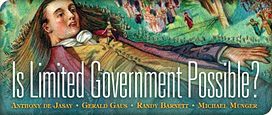Lead Essay
Reprising the topic of his 1989 essay, “Is Limited Government Possible?” political theorist Anthony de Jasay continues to express limited skepticism. According to de Jasay, the incentive of political actors is to gain power by putting together winning coalitions, and to stay in power by rewarding their supporters at the expense of their opponents. If constitutional limits stand in their way, they will eventually be reinterpreted, undermined, or otherwise worked around. Governments are more delayed than limited by constitutional rules, like a lady with the key to her own chastity belt. If governments are effectively limited, de Jasay argues, then it is by means of the structure of campaign finance, the practical limits on tax rates, and public panic at the prospect of economic ruin. De Jasay admits conventional cultural and moral norms may limit government, but doubts these are strong enough to fully check the interests that drive politics.
Response Essays
In his reply essay, Gerald Gaus, the James E. Rogers Professor of Philosophy at the University of Arizona, argues that Anthony de Jasay has overlooked the importance of distinctively moral rules in regulating behavior. Drawing on recent work in psychology, Gaus distinguishes between conventional rules, which may be changed by the relevant authority without complaint, and moral rules, which may not. If constitutional limits on government fail, it is because these are seen as merely conventional rules out of sync with biologically and culturally evolved moral rules. “The welfare state reigns supreme not because the state and it allies have tricked the rest of us in a power grab,” Gaus argues. “It reigns supreme because in the eyes of most citizens it conforms to the egalitarian fairness norms that have evolved with humans.”
In his reply, Duke University political scientist Michael Munger agrees with de Jasay’s discussion of “the frontier between the ‘zones’ of individual and collective choice,” and provides a novel illustration. However, Munger disagrees that the problem with the “incentive-compatibility” of limits on power has been overlooked. He offers a classic historical example of incentive-compatible constraints and discusses the value of building conflicts of interest into political institutions through the separation of powers. “The last thing you want is an efficient government. Our only choices are a truly weak, but efficient, limited government, or else a powerful government prevented by strong ties from using most of its powers, most of the time.”
Randy Barnett, the Carmack Waterhouse Professor of Legal Theory at Georgetown University Law Center, notes that limited government is possible because it is actual, but acknowledges that “given that some limits on power clearly remain, these constraints failed to hold the line the Framers were attempting to draw.” Barnett argues that the mechanisms of limited power embodied in the Constitution — reciprocity, checks and balances, and the power of exit — would be more successfully realized in a “polycentric constitutional order in which one would subscribe to a legal system of one’s choice as today one subscribes to cell phone service, health and auto insurance, or private security providers.” Understanding why this would be an improvement “can help us appreciate why restoring the characteristics of the original Constitution as amended by the Fourteenth Amendment … would be far preferable to the constitutional status quo,” Barnett writes.

